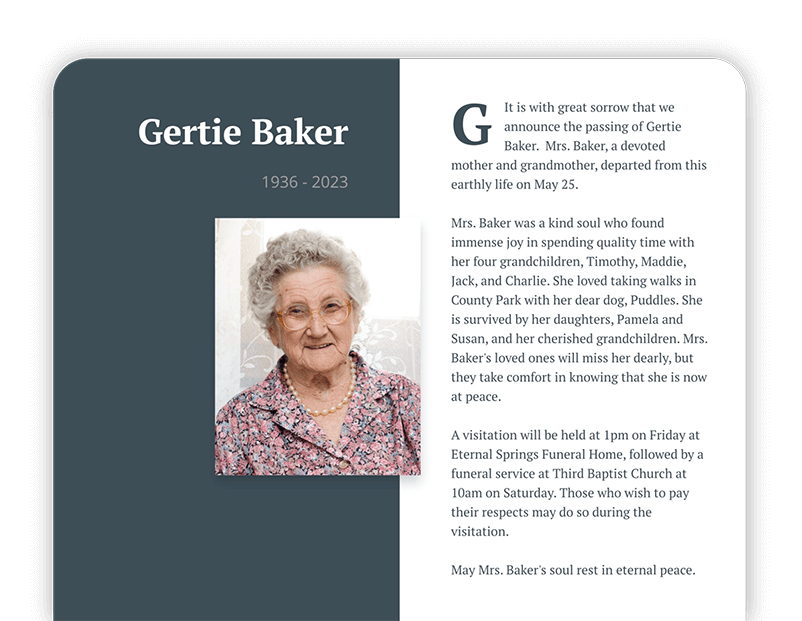In today's fast-paced world, news and advanced obituaries play a crucial role in how we communicate and remember those who have passed away. This article delves into the significance of obituaries, how they have evolved over time, and their impact on society. With the rise of digital platforms, the way we consume news and obituaries has transformed, making it essential to understand the nuances involved in crafting these messages.
The concept of obituaries goes beyond mere announcements of death; they are a celebration of life, a way to honor the memories of individuals, and a source of comfort for the bereaved. In this guide, we will explore what makes an obituary effective, the elements that should be included, and the ethical considerations involved in writing and publishing them.
As we navigate through this comprehensive article, we will also touch upon the importance of news in the context of obituaries, the advancements in this field, and the future trends that may shape how we remember and honor lives lost. Whether you are looking to write an obituary for a loved one or simply wish to understand this vital aspect of life, this article is designed to provide you with the knowledge you need.
Table of Contents
- What is an Obituary?
- The History of Obituaries
- Elements of an Effective Obituary
- Ethical Considerations in Writing Obituaries
- The Role of News in Obituaries
- Advancements in Obituaries
- Future Trends in Obituaries
- Conclusion
What is an Obituary?
An obituary is a published notice of a person's death, often including a brief biography and details about their life, achievements, and funeral arrangements. Traditionally found in newspapers, obituaries have become more prevalent online, with many dedicated websites facilitating the sharing of this information. They serve multiple purposes, such as informing the community, celebrating the deceased's life, and providing comfort to grieving families.
The History of Obituaries
The practice of writing obituaries can be traced back to ancient civilizations, where the deaths of notable figures were documented to preserve their legacies. Over time, this practice evolved, with newspapers in the 18th century formally adopting obituaries as part of their reporting. Today, obituaries have become a blend of traditional journalism and personal storytelling, reflecting the changing dynamics of society.
Evolution of Obituaries
- Ancient Civilizations: Documenting Deaths
- 18th Century: Newspaper Integration
- Modern Era: Digital Transformations
Elements of an Effective Obituary
Crafting an obituary requires careful consideration of several key elements to ensure it honors the deceased's life adequately. Here are the essential components:
- Full Name: Include the full name of the deceased, along with any nicknames they were known by.
- Date of Birth and Death: Clearly state the dates to provide context.
- Biographical Information: Highlight significant life events, achievements, and contributions.
- Family Details: Mention surviving family members and their relationships.
- Funeral Arrangements: Provide information about the service, including date, time, and location.
Ethical Considerations in Writing Obituaries
When writing obituaries, it is crucial to adhere to ethical standards to ensure respect and sensitivity. Here are some considerations:
- Accuracy: Ensure all information is correct and verified.
- Consent: Obtain permission from family members before publishing sensitive details.
- Respect Privacy: Be mindful of what personal information is shared publicly.
The Role of News in Obituaries
Obituaries are often featured in news outlets, serving as a bridge between journalism and personal storytelling. They provide the community with a chance to reflect on the lives of those who have passed, fostering a sense of connection and memory.
Advancements in Obituaries
With the rise of technology, the landscape of obituaries has changed dramatically. Digital platforms now allow families to create online memorials, share stories, and even receive condolences from around the world. Here are some advancements:
- Online Memorials: Websites dedicated to creating lasting tributes.
- Social Media: Sharing news of passing and memorial events on various platforms.
- Video Tributes: Using multimedia to celebrate lives.
Future Trends in Obituaries
As society continues to evolve, so will the way we remember and honor those who have passed. Future trends may include:
- Interactive Obituaries: Allowing for more engagement and personalization.
- Artificial Intelligence: Assisting in crafting obituaries based on available data.
- Virtual Reality Memorials: Creating immersive experiences to honor lives lost.
Conclusion
In summary, news and advanced obituaries serve a vital role in our society, allowing us to honor the memories of those we have lost while providing information to the community. Understanding the elements that make an obituary effective, as well as the ethical considerations involved, can help ensure that we remember and celebrate lives in a meaningful way. We encourage readers to share their thoughts, experiences, or questions in the comments section and to explore more articles on this site for additional insights.
Call to Action
If you found this article helpful, please consider sharing it with others who may benefit from this information. Your feedback is important to us, so don't hesitate to leave a comment or question below!
Thank you for reading, and we hope to see you back on our site for more insightful content.
Exploring The Life And Achievements Of Gill Ellis Young
Taylor Hill: The Rise Of A Supermodel
Understanding Yuri Hentai: A Deep Dive Into The Genre


